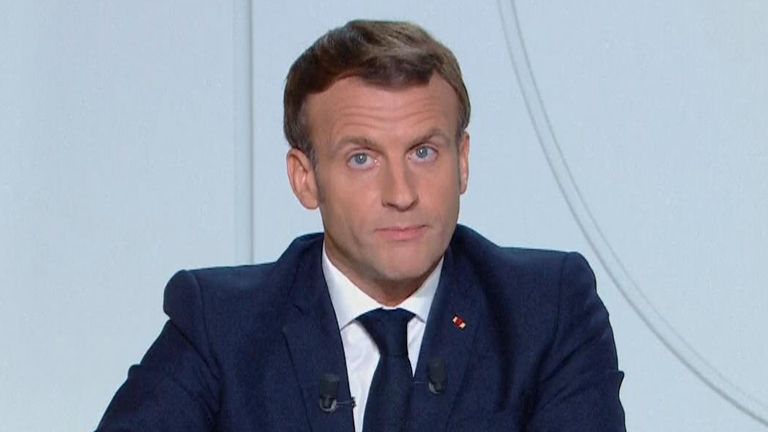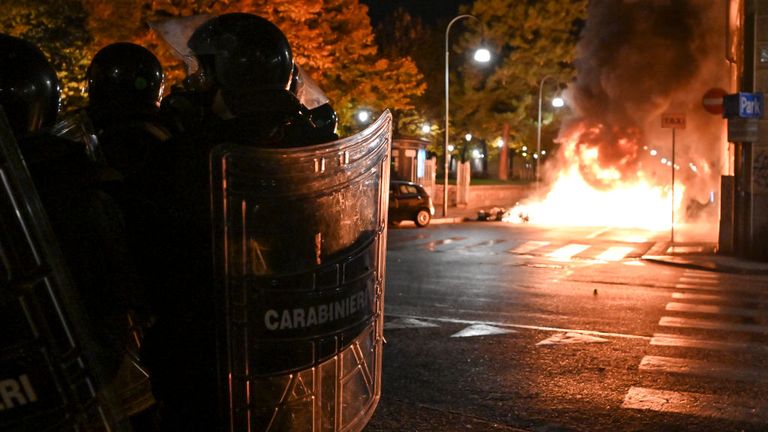France and Germany have become the latest countries to announce second lockdowns as Europe struggles to bring the latest wave of coronavirus under control.
French President Emmanuel Macron told his citizens on Wednesday that COVID-19 had "overwhelmed" France, while German Chancellor Angela Merkel said in her own national address that Germany must act now "to avoid an acute national health emergency".
In the past seven days, the EU, Britain, Norway, Switzerland and Iceland have accounted for 1.1 million cases of the virus, according to European Commission President Ursula von der Leyen, who warned the numbers will rise "rapidly".
She told journalists in Brussels that this could mean "this year's Christmas will be a different Christmas" for a continent "deep in the second wave".
The second French lockdown, however, will look a little different to Germany in its approach.
What are the restrictions in France?
Beginning Friday and until 1 December, people in France will only be allowed to leave their homes to buy essential goods, for medical reasons and to exercise for an hour a day.
Anyone who wants to go outside will be required to fill out an "attestation" - a form that was also required to leave home during the first lockdown.
The newspaper Le Parisien says the office of the French Prime Minister has confirmed that people will be allowed outside up to 1km from their home.
This also means all non-essential businesses will be forced to close, including restaurants, bars and many shops.
A travel ban will be in place between regions, while national borders with counties outside the Schengen Area will be closed.
Remote working has been advised where possible and universities are set to move their teaching schedules online.
Unlike the first lockdown, however, schools and creches will remain open. Care home visits will also be allowed.
And Germany?
Mrs Merkel has revealed German restrictions to be a "lockdown light," starting on 2 November and lasting for four weeks.
Under the rules, bars and pubs will close, while restaurants will remain open for takeaways only.
Shops will remain open with restrictions on space - meaning a maximum of one person per 10 square metres of shop floor will be permitted.
Gyms, cinemas and theatres will close, along with hotels closing to tourists.
Indoor gatherings will be limited to 10 people and can include no more than two households.
Like France, schools, nurseries and day care centres will stay open - and care homes will be able to admit visitors.
Just how bad is the situation in France?
There were 36,437 news cases of COVID-19 recorded in France on Wednesday, up from 33,417 the day before.
Mr Macron noted the figure is more likely to be between 40,000 and 50,000 "new identified contaminations each day".
This also comes after another 520 deaths on Tuesday, which includes 288 in hospital within 24 hours and 235 in nursing homes over the four days prior. These are both the highest rises since May.
More than half of France's intensive care units are also already filled with COVID-19 patients.
What about Germany?
Another 14,964 infections were reported on Wednesday, bringing the total to 449,276, according to the country's disease control agency.
This may seem like Germany has had a steadier rise in cases than it's European neighbours, but Mrs Merkel warned that intensive care capacity could be breached.
She said the number of people in intensive care beds had doubled in the last 10 days alone, and would reach capacity if the virus continued spreading at its current rate.
Is it the same for wider Europe?
Belgium, the Netherlands, Spain and the Czech Republic are also all struggling to keep their respective outbreaks under control, with each recently introducing extra measures.
In Italy, a record high of 24,991 cases was reported on Wednesday, which came as thousands of people protested against re-imposed lockdown measures.
The national government ordered restaurants, bars, gyms and cinemas to close from 6PM on Monday, while night-time curfews remain in place for the worst-affected cities.
This resulted in clashes in several parts of the country as police dispersed anti-lockdown protesters with tear gas in Milan, and petrol bombs were thrown in Turin.
Huge crowds also gathered in Naples.
"This time we have two enemies," Ms Von der Leyen said this week as she acknowledged the virus and the mental toll restrictions have had.
She noted that "corona fatigue" was part of a "growing weariness when it comes to precautionary measures," but added that "now is not the time to relax."
https://news.google.com/__i/rss/rd/articles/CBMicmh0dHBzOi8vbmV3cy5za3kuY29tL3N0b3J5L2Nvcm9uYXZpcnVzLWxvY2tkb3duLXJldHVybnMtdG8tZnJhbmNlLWFuZC1nZXJtYW55LWhlcmVzLXdoYXQteW91LW5lZWQtdG8ta25vdy0xMjExNzI4MNIBdmh0dHBzOi8vbmV3cy5za3kuY29tL3N0b3J5L2FtcC9jb3JvbmF2aXJ1cy1sb2NrZG93bi1yZXR1cm5zLXRvLWZyYW5jZS1hbmQtZ2VybWFueS1oZXJlcy13aGF0LXlvdS1uZWVkLXRvLWtub3ctMTIxMTcyODA?oc=5
2020-10-28 22:47:51Z
52781142064636




Tidak ada komentar:
Posting Komentar